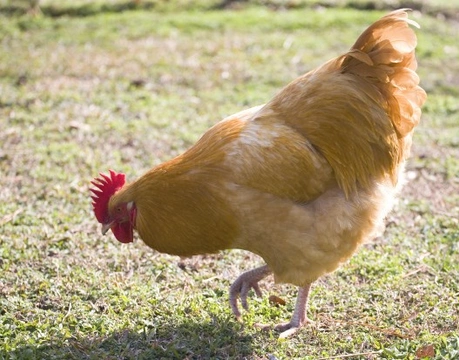
Leg Problems and Lameness in Chickens
If you are new to keeping chickens there are certain conditions that can affect their legs and feet which crop up for no apparent reason. All too often catching a chicken can be a real problem, especially if they don't know you very well and it's important to do this as calmly as possible to avoid them injuring themselves and/or getting stressed out. Sometimes it is easier for two people to catch a sickly hen and once caught, you can then check their legs and feet to see where they have been injured.
If you find a cut and it's bleeding, you need to treat the wound with an antiseptic powder or ointment and then apply a bandage to it. However, if you cannot stop the bleeding a quick trip to the vet would be in order. The vet would be able to prescribe a course of antibiotics which should deal with any sort of bacterial infection that may have set in. Luckily, injuries to the leg don't normally bleed that much because of the restricted blood flow to them.
Keeping Nails Trimmed
It's also important to check nails on a regular basis to make sure they have not grown too long which can cause chickens a lot of pain and discomfort. If your birds are free range this is not normally a problem because they will wear them naturally. However, if you keep your hens indoors during the winter months, you may need to trim their nails from time to time.
If you are unsure of how to do this you should ask your vet or a veterinary nurse. They would be able to show you how to trim chicken nails so you avoid cutting them back too far which would cause nails to bleed. Trimming a little at a time and working your way back is the safest way. However, if you do hit a blood vessel, a quick drop of super glue on the nail will stem the bleeding and stop any infection from taking hold.
Scaly Leg Mite
A chicken's legs should be nice and smooth to the touch but if you find the scales are raised, this is typically caused by a mite that burrows under them which are called Knemidocoptes mutans. The condition is more commonly referred to as scaly leg. It is important not to attempt to pick the scales off but to smother them in Vaseline which suffocates the mites, but you should also dip the hen's legs in surgical spirits every week. It can take quite a bit of time for affected scales to fall off and new ones regrow which means you have to be patient and not be tempted to pull the scales off.
Worm Issues
If chickens have a severe infestation of intestinal worms, it can cause them to go "off" their legs but if you regularly worm your flock with Flubenvet, this should never happen. However, another condition that may cause your hens to go lame is coccidiosis which you should treat as soon as possible with a product made by Harkers called Coxoid Oral Solution which is very easy to administer because you just need to add the recommended amount to your bird's drinking water for a week.
Mycoplasma Synoviae
If you find a hen is lame you need to examine her leg as soon as you can. Once you have caught her, feel her leg starting at the foot and working your way upwards. If there's any swelling or the leg feels hot to the touch, this could be condition caused by Mycoplasma synoviae and it's a condition that should not be taken too lightly. A quick trip to the vet would establish if this is the case and they would be able to put your hen on a course of antibiotics which typically is Tylan, an oral antibiotic.
Bumblefoot
If you cannot find any obvious signs of injury to the leg, you then need to check the sole of the foot because it could be that an infection has set in which is caused by Staphylococcus bacteria. The bacteria enters into a wound no matter how small a chicken may have on their foot and the pad then becomes swollen, infected and very painful which is a condition known as bumblefoot.
If you gently squeeze the swelling, you may find pus comes out which means you would need to disinfect the wound. The vet would be able to prescribe a course of antibiotics to deal with the infection but it is important to find out why the condition developed in the first place.
Larger and heavier chickens are more prone to developing bumblefoot but if a bird has a small wound on their pads the bacteria can get in causing an infection to any sized bird. A good antibiotic to treat bumblefoot is Tylan which you can put in their drinking water.
Conclusion
If you notice a chicken limping, lame or reluctant to stand up and run around as they normally do, they might well have an injury to a leg or an infection on a pad that's causing them a lot of pain and discomfort. As with all injuries and conditions, the sooner you treat the chicken the speedier their recovery would be and you reduce the risk of a more serious complication setting in. If in doubt, a quick trip to the vet would be in order so they can diagnose the problem and treat the condition sooner rather than later.



